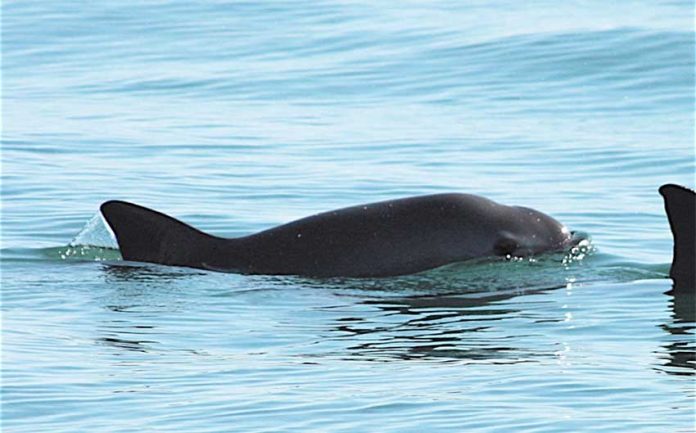Only 22 vaquita marina porpoises remain in the Gulf of California, a biology professor said yesterday, warning that the species could become extinct within months.
Jorge Urbán Ramírez, a professor at the Autonomous University of Baja California Sur, said that scientists from the International Committee for the Recovery of the Vaquita (CIRVA) will release an official report this weekend about the vaquita population.
The 22 vaquitas were heard over a network of acoustic monitors at the end of the summer, he said.
The remaining population of the species, which is endemic to the northern part of the gulf, is higher than many expected but Urbán warned on Twitter that the vaquita is still highly vulnerable to extinction.
“. . . Unless actions are taken the vaquita could be lost in the coming months or years . . .” he wrote.
The primary threat to the vaquita population are gillnets that are used to catch totoaba, a protected fish whose swim bladders are considered a delicacy in China and yield high prices.
The world’s smallest porpoises often become entangled in the nets and drown.
Although gillnets are banned in the upper gulf, fishermen continue to use them and with the peak of the totoaba season still to come in May, there are fears that the vaquita could be wiped out this spring.
However, the Sea Shepherd Conservation Society says it is doing all it can to prevent that from happening.
Every night, volunteer crew members go out on ships operated by the environmental group to search for and remove hidden gillnets.
But fishermen, for obvious reasons, haven’t welcomed their presence and twice in the last month the Sea Shepherd ship Farley Mowat has been attacked with rocks and firebombs.
“If we stop operations, the vaquita will go extinct,” Sea Shepherd first mate Jack Hutton told the Associated Press.
“. . . If we stop removing them [the gillnets] then there is no hope for the vaquita . . . We know we are going to keep getting attacked. We know we are risking out lives, but if we don’t the vaquita has no chance,” he said.
Marines and Federal Police are also contributing to the efforts to protect the vaquita and fired rubber bullets from the Farley Mowat during the recent attacks.
But according to Richard Ladkani, a filmmaker who made a documentary about the plight of the vaquitas, the marines have been intimidated by fishermen.
While shooting his film – Sea of Shadows – Ladkani accompanied the navy on nighttime patrols that included high-speed chases in which fishermen succeeded on occasions in ramming into naval boats and disabling their engines.
“Why is the navy not using force?” he questioned. “We were on 10 chases and every time the pangas [fishing boats] got away.
Ladkani also offered a theory about why fishermen are becoming so violent and desperate.
He said that because the Sea Shepherd has been successful in removing gillnets, fishermen are going into debt borrowing money from Chinese and Mexican totoaba traffickers to buy new ones at around US $3,000 each.
“This is a vicious circle where people get more indebted,” Ladkani said.
“This one fisherman wound up owing the cartels $54,000 for 18 nets. He tried to get out, he finally came out and said there is no way I can repay the cartel. He was murdered.”
Sunshine Rodríguez, a leader of fishermen in the Baja California town of San Felipe, said that it is a myth that fishermen are getting rich selling totoaba swim bladders.
“I know people who are dedicated 100% to that [totoaba] business and don’t even have $10 to put gas in the tank of their panga,” he said. The Chinese are making the profit, that I can tell you.”
Rodríguez said a fisherman can currently sell a half-kilogram totoaba swim bladder for about US $400 but traffickers are cutting the prices they pay and will continue to do so because they know that the fishermen have no other options to make a living.
Government payments meant to compensate fishermen for lost income as a result of the ban on gillnets haven’t been made in three months, he said.
In compensation payments that the government has made as part of the Endangered Species Conservation Program (Procer), the Federal Auditor’s Office (ASF) has detected a range of irregularities.
The ASF said in a report that 220,000 pesos (US $11,300) had gone to deceased persons and 96,000 pesos to fishermen who don’t live in the upper Gulf of California area.
More than 2.4 million pesos (US $123,000) went to people who don’t have valid fishing licenses and 744,000 pesos was paid to fishermen who didn’t provide documentation that proved their address. A further 3.7 million pesos was spent on duplicate payments, the ASF found.
“This multi-million-peso support has been misused through non-transparent welfare policies,” said Alejandro Olivera, Mexico representative for the Center for Biological Diversity.
“Those who really go out to fish” have received little or no financial support, he added.
With time seemingly running out for the vaquita marina, more than 50 environmental and conservation groups wrote to federal Environment Secretary Josefa González Blanco and Agriculture Secretary Víctor Villalobos last month to urge them to strengthen government programs to protect the species.
“. . . If conservation measures aren’t taken, the law isn’t applied and the decline [in vaquita numbers] continues at its current pace, it’s probable that the vaquita will become extinct during your [six-year] administration,” the groups said.
Ladkani, the filmmaker, was even more pessimistic.
“When it’s totoaba season at the end of May, they may have killed everything by then.”
